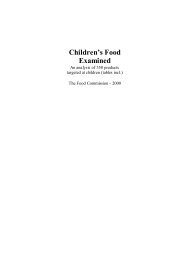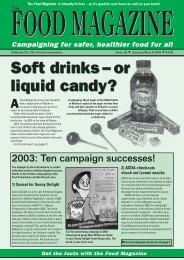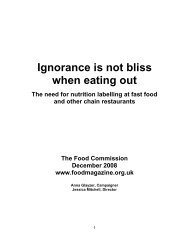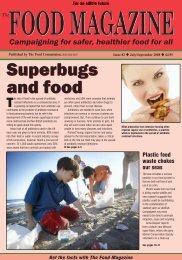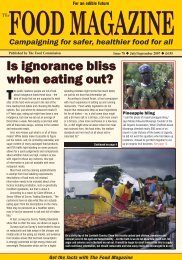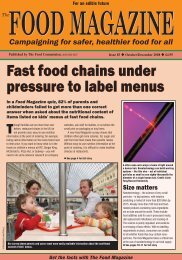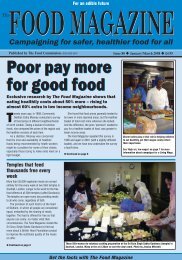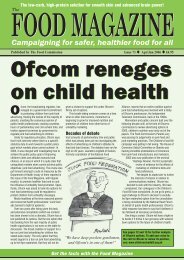Children's Nutrition Action Plan - The Food Commission
Children's Nutrition Action Plan - The Food Commission
Children's Nutrition Action Plan - The Food Commission
You also want an ePaper? Increase the reach of your titles
YUMPU automatically turns print PDFs into web optimized ePapers that Google loves.
Note: <strong>The</strong> National Healthy School Standard has specific themes that a school can choose to<br />
implement. If the school chooses to work on the healthy eating theme then the quality<br />
standards it must reach are as follows:<br />
• <strong>The</strong> school presents consistent, informed messages about healthy eating, for example,<br />
food on offer in vending machines, tuck shops and school meals should complement the<br />
taught curriculum;<br />
• <strong>The</strong> school provides, promotes and monitors healthy food at lunch and break times and in<br />
any breakfast clubs where they are provided;<br />
• <strong>The</strong> school includes education on healthy eating and basic food safety practices in the<br />
taught curriculum.<br />
(6) After school clubs and study support<br />
Over 95% of schools provide some form of study support and most schools have increased<br />
provision in recent years. Much of this change can be attributed to strategic direction and<br />
support from central Government, including action research pilots to inform the development<br />
and production of good practice materials, establishing a critical friend network to<br />
disseminate best practice and dedicated funding of £205m from the New Opportunities Fund<br />
and £80m from Standards Fund. Evaluation shows that pupils who participate in study<br />
support do better in academic attainment, attitudes to school and attendance at school.<br />
(7) <strong>Food</strong> education<br />
<strong>The</strong> National Curriculum Programmes of Study provide a statutory framework for education<br />
from the ages of 5-16 (the revised curriculum was introduced in September 2000).<br />
<strong>Food</strong> education, ITT and CPD Key Stage 1-2<br />
Mandatory programmes of study in Science ensure that all primary pupils learn about<br />
nutrition. D&T includes opportunities for nutrition and hygiene to be taught through practical<br />
food preparation and, PSHE (non-mandatory at present) provides further opportunities,<br />
although teaching staff will not generally have specialist training in food education. During<br />
their initial training primary trainees all have access to an interactive CD-ROM, through<br />
which they can achieve a food safety certificate. However, many primary teachers remain<br />
inadequately trained to undertake practical food work and the <strong>Food</strong> in Schools initiative is<br />
piloting a fully evaluated CPD programme to redress this situation.<br />
<strong>Food</strong> education, ITT and CPD Key Stage 3<br />
Mandatory programmes of study in Science ensure that all 11-14 year old pupils can learn, in<br />
more detail, about nutrition through specialist teaching. Those programmes for food<br />
technology, within D&T, are non- mandatory. 90% of pupils experience food education,<br />
including nutrition and food hygiene taught through food preparation. PSHE provides further<br />
opportunities, although teaching staff will not generally have specialist training in food<br />
education. CPD in food technology, including some excellent website provision, has ensured<br />
that all teachers have access to high quality and relevant information and pedagogy. Many<br />
schools have set up School <strong>Nutrition</strong> <strong>Action</strong> Groups where science and food technology<br />
teachers work with others to ensure a consistent healthy message is given by all. However,<br />
there are issues about the time-allocation for practical food preparation at Key Stage 3<br />
because of the perceived low status (non-mandatory) of the subject and from other pressures<br />
upon the curriculum.<br />
<strong>The</strong> Children’s <strong>Nutrition</strong> <strong>Action</strong> <strong>Plan</strong>, published by <strong>The</strong> <strong>Food</strong> <strong>Commission</strong><br />
43



